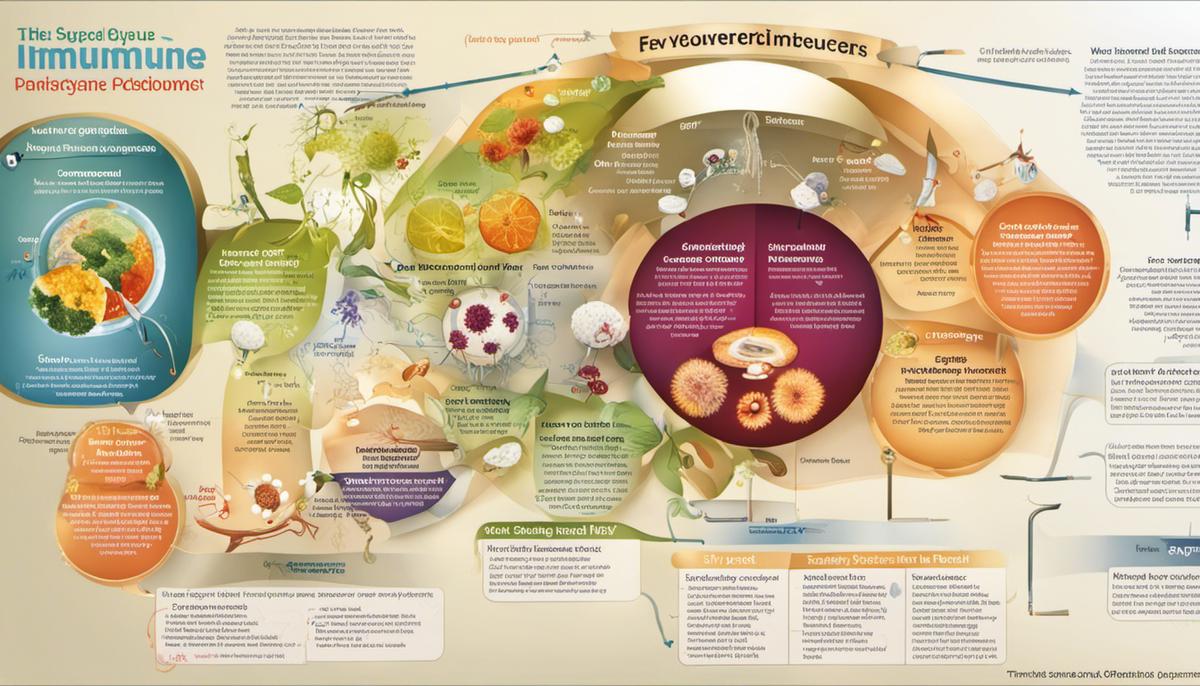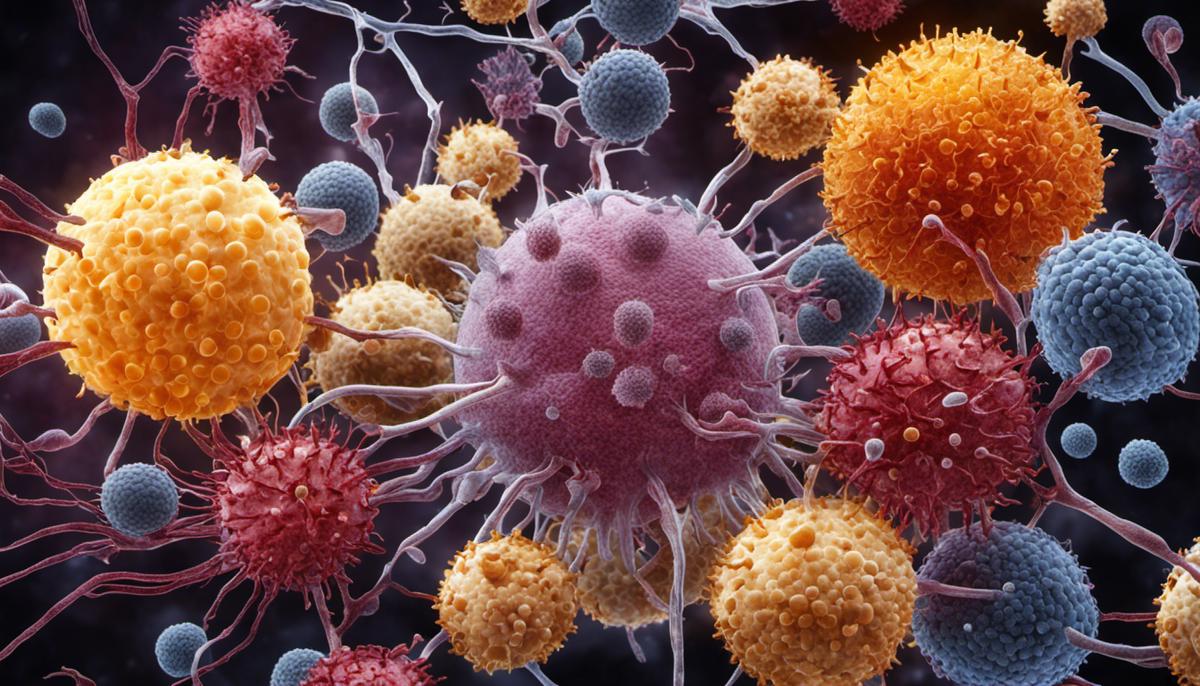In the vast, intricate network that constitutes the human body, the immune system serves as our prime defense against harmful intruders, working relentlessly to protect and preserve our health. The foundation of this internal safeguard rests on an interwoven assortment of cells, organs, proteins, and tissues — most notably, the indomitable white blood cells, protective antibodies, and the resilient lymphatic system. Grappling with the task of hold off diseases and illnesses, proper understanding of this complex system becomes crucial, which inevitably leads to a discussion around common immune system disorders and their implications. Furthermore, the existence of myriad natural ways to strengthen this potent system piques our interest, pointing us to the role of diet, exercise, sleep, and stress management. Despite popular narratives and misconceptions about immunity boosting, approaching such methods needs careful consideration and professional advice to mitigate any undesired effects of overstimulation. This brings forth an elucidative exploration of the human immune system, its disorders, and natural remedies for a healthy immunity.
Understanding the Immune System
The human immune system
The human immune system is an intricate network of cells, tissues, and organs that work together to defend the body against harmful invaders, including viruses, bacteria, and other pathogens. It operates as a sophisticated detection system, alerting the body to potential threats and engaging a variety of defense mechanisms to neutralize them.
Components of the immune system
The immune system is composed of two primary components – the innate immune system and the adaptive immune system. The innate immune system is the body’s first line of defense, providing immediate but generic protection against any foreign bodies or pathogens. It includes physical barriers like the skin and mucous membranes, immune cells such as phagocytes and natural killer cells, and proteins such as cytokines and complement proteins.
The adaptive immune system, on the other hand, responds to specific pathogens the body has encountered before. Its primary components are lymphocytes, a type of white blood cell. Of these, B lymphocytes produce antibodies that bind to specific pathogens, while T lymphocytes destroy cells infected by these pathogens.
White blood cells
White blood cells, or leukocytes, are the heroes of the immune system. They are produced or stored in various locations in the body, including the thymus, spleen, and bone marrow. When the body senses foreign substances, known as antigens, these cells go into action, recognizing and remembering specific pathogens, and thus providing the body’s acquired immunity.
Antibodies
Antibodies, also known as immunoglobulins, are proteins produced by B lymphocytes in response to specific antigens. Each antibody can bind to a particular antigen, flagging it for destruction by other immune cells.
The lymphatic system
The lymphatic system, including the lymph nodes, lymph vessels, thymus, and spleen, plays a central role in the immune system. Lymph vessels transport a fluid called lymph, carrying white blood cells and antibodies throughout the body to battle infections. The lymph nodes, where these immune cells are stored, swell when the body is fighting off an invader.
Boosting the immune system
Boosting your immune system naturally involves a combination of lifestyle choices. Eating a diet rich in fruits, vegetables, lean proteins, and healthy fats can provide the variety of nutrients needed for a strong immune system. Regular physical activity can bolster the immune response, as can maintaining a healthy weight, getting adequate sleep, minimizing stress, and avoiding tobacco and excessive alcohol.
Foods for immune-boosting
Additionally, certain foods are known for their immune-boosting properties. These include citrus fruits which are loaded with vitamin C, bell peppers which are high in vitamin C and beta carotene, broccoli which is packed with vitamins C, A, and E, and spinach which contains an array of antioxidants and beta carotene. Foods rich in omega-3 fatty acids, like salmon and mackerel, can also boost the immune system by reducing inflammation.
Nourishing your Body with Probiotics
Introducing probiotics into your daily diet is one natural way to boost your immune system. These beneficial bacteria live within your digestive system and provide support to your immune system. Foods that are high in probiotics include yogurt, fermented foods such as kimchi and sauerkraut, along with drinks like kefir and kombucha.

Common Immune System Disorders
Recognizing the Impact of Immune System Disorders
Now, understanding your immune system also includes being aware of disorders that can hinder its effectiveness. These disorders can occur when the immune system overreacts to elements that are not harmful or does not respond effectively to actual threats. Such conditions fall mainly into two categories: autoimmune diseases, which cause the immune system to mistakenly attack the body’s own cells; and immunodeficiency disorders, where the immune system does not sufficiently defend the body from infections and diseases.
Autoimmune Diseases: Symptoms, Causes, and Impact on Health
Autoimmune diseases are known to affect different parts of the body and come with a variety of symptoms depending on the type. Common symptoms include fatigue, muscle aches, inflammation, and low-grade fever. However, more specific symptoms can occur. For instance, Type 1 diabetes—a common autoimmune disease—causes excessive thirst, hunger, and urination, while Rheumatoid arthritis can result in swollen, painful joints.
Autoimmune diseases are fundamentally caused by an overactive immune system, although the exact reasons why this happens are not fully known. It’s believed that both genetic and environmental factors contribute, creating a situation where the body’s immune system views its own cells as foreign invaders and tries to destroy them. This can have a significant impact on overall health, leading to functional issues with the affected areas and even resulting in chronic pain and damage.
Immunodeficiency Disorders: Symptoms, Causes, and Impact on Health
Immunodeficiency disorders, on the other hand, are characterized by recurrent infections that can be difficult to treat. Common symptoms include repeated pneumonia, ear infections, sinusitis, skin rashes, and digestive problems. These may be accompanied by slow growth or weight gain in children, which are telltale signs of a deficient immune system.
Compared to autoimmune disorders, immunodeficiency disorders are often inherited or may arise as a result of certain medical treatments. In these situations, the immune system fails to react adequately, leaving the body vulnerable to infections and diseases that a healthy immune system would typically fight off. As a result, overall health can be greatly compromised due to frequent illnesses and difficulties in healing.
Boosting Immune System Naturally
Despite the risks posed by immune system disorders, there are ways to boost your immune system naturally with a focus on lifestyle choices. Adopting a well-balanced diet filled with fruits, vegetables, lean proteins, and whole grains can help as these foods are rich in nutrients essential for immune health. Regular exercise is also important as it can improve immune response and lower illness rates.
Mental wellbeing is another critical component. Studies suggest that chronic stress can suppress the immune system, hence it’s important to engage in stress-relieving activities such as yoga, meditation, or even simple breathing exercises.
Adequate sleep is beneficial as it helps to re-energize the cells and substances of the immune system. Aim for at least 7 to 9 hours of sleep per night. Finally, avoid habits like smoking and excessive drinking, which can impair your immune system’s functioning.
Prior to embarking on any major lifestyle modifications, it is advisable to seek guidance from a healthcare professional. This is due to the fact that these changes should ideally be based on your unique health status. Specifically, individuals with immune system disorders must exercise particular caution since not all immune-boosting methods might be suitable for them.

Natural Ways to Boost the Immune System
Boosting Immunity Naturally: The Role of a Healthy Diet
One reliable method for naturally strengthening the immune system is focusing on a nutrient-rich, balanced diet. This dietary approach not only ensures the body has all the essential nutrients for optimal functioning, but it also plays a major role in maintaining a robust and alert immune system. Consuming foods high in vitamin C, such as citrus fruits, strawberries, bell peppers, and broccoli, is known to enhance immune system functionality. Similarly, zinc, found in lean meats, poultry, seafood, milk, and whole grains, is crucial to the functioning of the immune system.
Regular Exercise for a Stronger Immunity
Physical activity doesn’t just tone your muscles and help control weight; it also aids in promoting a healthy immune system. Regular exercise promotes good circulation, which allows the cells and substances of the immune system to move freely within the body and do their job efficiently. Moderate exercises such as brisk walking, biking, jogging, or yoga can be adequate to enhance immunity.
The Role of Adequate Sleep in Immune Health
Sleep isn’t merely a time for your body and brain to rest. It’s also a critical period for the immune system to regenerate and build up strength. Not getting enough sleep or getting poor quality sleep can negatively affect the body’s immune function. Adults should aim for at least 7-9 hours of sleep per night to help maintain optimal immune function.
Managing Stress for Immune System Support
Prolonged periods of intense stress can create an imbalance in the immune cell functions, making you more susceptible to infections. Mindfulness techniques, such as meditation and yoga, can help manage stress levels and thus support a healthier immune system. Incorporating these practices into your lifestyle can improve your body’s ability to fight off illness.
Beneficial Foods, Vitamins, and Herbal Supplements
Certain foods, vitamins, and herbal supplements can contribute to a stronger immune system. Vitamin D, for instance, is crucial for immune health. Getting sunlight exposure, eating vitamin D-rich foods like fatty fish and eggs, and taking supplements can help maintain adequate levels in the body. Multivitamin supplements can also assist in bridging nutritional gaps for a healthier immune system. Herbal supplements such as echinacea, garlic, and elderberry are often used as natural immune boosters, but be sure to consult with a healthcare provider before starting any herbal regimen.
Hydrate and Hydrate Some More
Staying hydrated helps your body naturally eliminate toxins and other bacteria that may lead to illness. Aim for at least eight 8-ounce glasses of fluid such as water, fruit-infused water or herbal tea per day. Dehydration can cause headaches and hinder your physical performance, focus, mood, digestion, and heart and kidney function. These complications can increase your susceptibility to illnesses.
Quit Smoking and Limit Alcohol Consumption
Habits like smoking and excessive drinking can severely weaken your immune system and make you more susceptible to infections like pneumonia and other lung diseases. If you smoke, quit now, and make sure you limit your alcohol consumption. This leaves your white blood cells, which are critical for your immune system, free to fight off infection.
Maintaining a Healthy Weight
People with obesity are often seen to have impaired immune response, leading to increased risk of infection. Maintaining a healthy weight can support your immune system, leading to decreased illness and increased overall health. Eat a diet rich in fruits, vegetables, lean proteins, and whole grains while limiting processed foods and sugary drinks. Regular physical activity also can help you maintain a healthy weight.
Your health’s first line of defense is your immune system. To keep it robust and resilient, particularly during flu and cold seasons, you should prioritize balanced nutrition, regular exercise, ample sleep, and stress management. Remember, these natural ways of boosting your immune system are not only beneficial for fighting infections but also essential for your overall health. Additionally, don’t forget time-tested preventative health measures such as conscientious hand hygiene and timely vaccinations.

Precautions and Misconceptions about Immunity Boosting
The Intricacies of Immunity and How to Bolster It Naturally
Our immune system is a complex assembly of cells, tissues, and organs harmoniously collaborating to shield us from harmful microorganisms. Having a potent immune system is crucial for maintaining our health as it serves as the primary fortress against everyday illnesses and infections.
To enhance the immune system naturally, it’s important to incorporate certain lifestyle changes. Unfailingly engaging in physical activity, adhering to a balanced diet enriched with fruits, vegetables, lean proteins, and whole grains are a few ways. Also, ensuring you get enough sleep and effectively manage stress can significantly fortify your immune system.
Supplements can also contribute to immune health. Vitamins C, D, E, B6, and B12, as well as essential minerals like zinc, iron, selenium, and copper, are known for their immune-boosting properties. Consuming foods rich in probiotics, like fermented food and certain types of yogurt, can help maintain a healthy gut microbiota, which is instrumental for a strong immune system.
Common Misconceptions about Immunity Boosting
A prevailing myth about the immune system is the notion that ‘the more stimulation, the better.’ However, overstimulation of the immune system can result in auto-immune diseases where your immune system starts attacking your own body’s cells.
Another misconception is that ‘starve a fever, feed a cold,’ implying that food intake should be altered based on illness type. In truth, good nutrition is consistently necessary for maintaining robust immunity, regardless of whether one is ill or not.
Furthermore, the effectiveness of mega-dosing vitamins, particularly vitamin C, for immunity boosting is widely misunderstood. While vitamin C does play a role in immune health, consuming it in excessively large amounts does not provide additional benefits and can have undesirable side effects.
Precautions in Immunity Boosting
Immunity boosting is not a one-size-fits-all concept. Individual differences in age, general health, genetic makeup, and lifestyle can significantly influence how one’s immune system responds to various immunity-boosting efforts.
Before starting any immune-boosting supplement regimens, individuals must consult healthcare professionals. Some supplements can interact with ongoing medications or underlying health conditions, leading to adverse effects.
Similarly, drastic lifestyle changes should not be implemented without professional guidance. For example, excessive exercise might weaken the immune system, contrary to providing the anticipated immunity boost.
Maintaining a healthy immune system is a continuous process, not a one-time effort. It requires a comprehensive and balanced approach that encompasses various aspects of lifestyle, nutrition, and physical health.
Importance of Professional Healthcare Consultation
Healthcare professionals can provide personalized advice based on an individual’s unique needs and circumstances. They can guide individuals on appropriate supplementation, dietary changes, stress management techniques, and exercise routines to enhance immune health.
Remember, the immune system is intricately connected with every other body system. Therefore, promoting overall health is critical to maintaining strong immunity. Always take caution and seek professional advice when attempting to boost your immune system naturally.

Grasping the fundamental principles of our immune system opens the door to taking proactive steps towards upholding our health. Understanding the signs and symptoms of common immune system disorders, alongside the science behind them, empowers us to notice early warning signals and address them appropriately. Additionally, acknowledging the power of natural ways to boost our immunity such as diet, exercise, sleep, and stress management is a key to unlock healthful longevity. The role of certain foods, vitamins and herbs in bolstering our internal defense cannot be undermined. Nonetheless, an informed approach is indispensable in light of common myths and over-commercialization of immunity-boosting remedies. Recognizing the limits and potential risks of overstimulating our immune system becomes an integral part of our health care equation. Withstanding the test of time, the adage ‘prevention is better than cure’ continues to hold true, especially when it comes to safeguarding our immune system.
